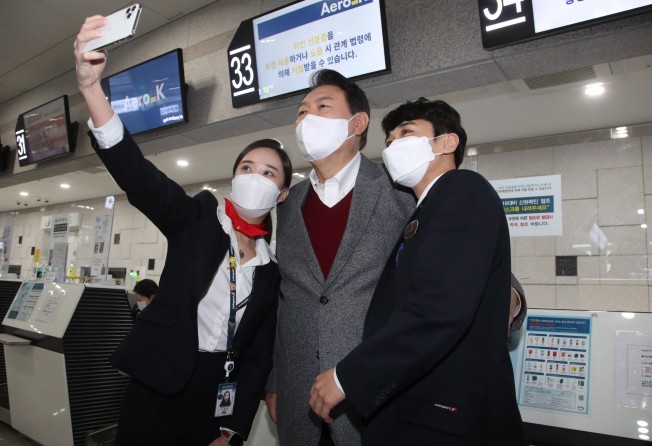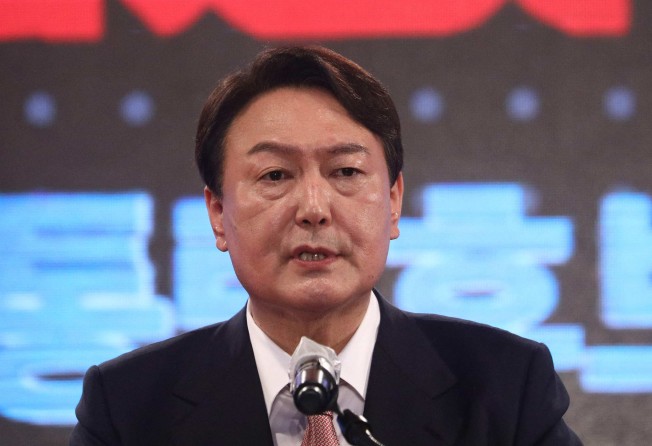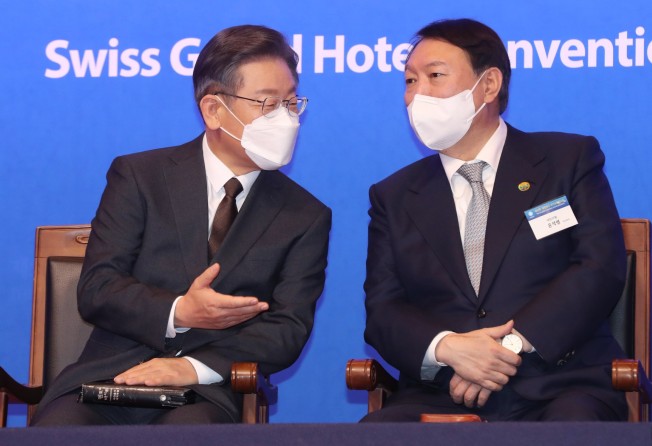
South Korea presidential hopeful blames Moon’s ‘pro-Beijing’ policies for fuelling bad blood between neighbours
- Former prosecutor Yoon Suk-yeol said Moon Jae-in tried and failed ‘to play the role of mediator’ between China and the US, fuelling negative sentiment
- The People Power Party candidate has vowed to align Seoul more closely to Washington and Tokyo if he wins South Korea’s presidential election in March

South Korean presidential hopeful Yoon Suk-yeol on Tuesday blamed the government’s “pro-China” policies for fuelling negative sentiment among younger Koreans towards their East Asian neighbour.
Yoon, a former prosecutor who has launched corruption investigations into the current administration led by President Moon Jae-in, argued that leadership’s “skewed policies” towards Beijing had upset a previous balance when Seoul “dealt with China based on strong cooperation between South [Korea], the United States and Japan”.
“The government attempted to play the role of mediator between China and the United States, but this ended up in failure,” he told a gathering of business leaders at the American Chamber of Commerce in Korea.

Such policies gave rise to a situation where Korean youngsters disliked China and “differently from the past, Chinese people, mostly young ones, don’t like South Korea either”, he said.
Political commentators and members of the ruling Democratic Party were quick to condemn Yoon for harming the national interest. China is South Korea’s largest trading partner, providing about 25 per cent of its export revenue and 21 per cent of imports by value.
While South Korea and Japan are allies of the United States, ties between Seoul and Tokyo have nosedived in recent years over unresolved territorial and historical disputes. Seoul has also taken a friendlier stance towards Beijing amid ongoing US-China tensions, most recently saying it would not join a US-led diplomatic boycott of the Beijing Winter Olympics, and highlighting China’s role in achieving denuclearisation of North Korea.
A Democratic Party spokeswoman described Yoon’s remarks as “crazy”.
“It’s hard to tell whether Yoon is just foolhardy or ignorant”, she said. “It is appalling to see a presidential candidate making such crass comments on international relations, saying someone dislikes someone else.”
“China is an important partner in issues including security, economy and climate changes but Yoon brushed aside ties with China with one stroke. How will he handle the diplomatic affairs of the country?”

Chang Young-il, a spokesman for Yoon’s campaign, said Yoon was pointing out the fact that Moon’s “spineless” diplomacy towards Beijing had resulted in worse ties with China and fuelled antipathy among citizens, especially the young.
Yoon, running on the ticket of the People Power Party for the March presidential election, has not shied away from taking a tough line on China, seeing it as a way to expand his support base ahead of next March’s presidential poll.
He has vowed to, if elected, end “strategic ambiguity” – Seoul’s balancing act between the US and China – and align the country more closely to Washington and Tokyo, including exploring deeper military cooperation. South Korea’s diplomacy must be based on “universal values” such as liberal democracy, human rights, and the rule of law, he said.
He has also urged Beijing to stop complaining about the highly sophisticated US missile defence system, Terminal High Altitude Area Defence (THAAD), deployed in South Korea, saying more deployments of the weapons are possible.
China retaliated economically against South Korea in 2017 after the missiles were deployed, suspending sales of package tours and hindering the operations of its companies. While both sides shelved their dispute later that year, public sentiment towards China took a hit. A survey by the Genron NPO and the East Asia Institute in September this year showed 73.3 per cent of Koreans have negative views towards China, up from last year’s 59.4 per cent.
Yoon’s remarks come as his rate of support in public opinion polls has suffered over a series of gaffes and allegations that his wife faked her academic credentials to obtain jobs.
The latest polls indicate that Yoon, a former prosecutor general who once enjoyed a comfortable lead over rival Lee Jae-myung, governor of the Gyeonggi province surrounding Seoul, is now running neck-and-neck with the liberal candidate.